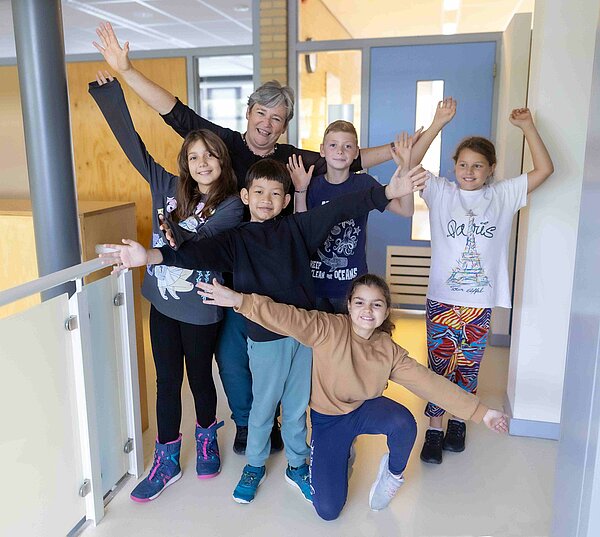'The newcomers as well as teachers are really hard workers'

Imagine moving to the Netherlands as a child and entering your new primary school. That's quite nerve-racking because you don't speak Dutch or understand the language. At the Eindhoven primary school De Wereldwijzer, a special program has been developed for children between the ages of 4 and 12 who come directly from abroad. The focus is on learning Dutch. "The young newcomers are all in the same boat, and that creates a bond," says Silvi Habets. She is the director of this primary school, and there is no place she would rather work than in this place.
Silvi has always been interested in other parts of the world and cultures. 'Someone recently asked me: if you had to do volunteer work later, what would it be? My answer was simple: I will keep doing the same," she laughs. 'I conduct all intake interviews with parents who move here. Sometimes, my day starts with a Teams meeting with parents from the Philippines, after which I meet a family from Brazil here at school. These families are full of expectations and often find it stressful. Not surprising. Children enter a classroom where they cannot understand the teacher and many other classmates. How great is it that I can help them with that?'
What is the purpose of De Wereldwijzer Primary School? Enroll the children in regular education within one on one and a half years. "The program is very intensive," Silvi explains. 'There is a lot of one-on-one guidance, and the children learn about eighty Dutch words weekly. They practice this at school, but also at home with their parents. The children are given the words to take home in videos. This way, parents can better help their children learn the words. And they also learn the Dutch language themselves.'
Newcomers Specialists
At school, students are assisted by so-called 'Newcomer Specialists.' They have a lot of expertise and experience in this area. 'The teachers have all completed the teacher training course, but ultimately, we want everyone to follow the training to become Newcomers Specialists. Most of the team has already completed this training. This way, we can help the students in the best way."
Hard workers
Children from 68 different countries are currently walking around the two locations of De Wereldwijzer. 'We work in blocks of ten weeks. Each time, we decide whether we want the children to move on to a group at a higher level.' Silvi beams when she talks about the students. 'They are really enjoying themselves here. And they want to learn so much. They are hard workers. Just like the teachers, who are also very involved.'
No sitters at home
There are so many registrations for De Wereldwijzer that not every child can go to primary school. 'The staff shortage is a problem at both our schools and other schools. Yet we want to ensure that all children find a place.' The newcomers working group in Eindhoven is concerned with children who cannot be placed at De Wereldwijzer. 'All with the result that we have no children at home in this region. And that is different in many big cities.'
Regular schools and De Wereldwijzer
Regular schools often work with transition and language classes. Yet many primary schools come to De Wereldwijzer to see how they work. 'Eventually, so many schools came by that we organized special viewing mornings. These are always full straight away.' With these viewing mornings, De Wereldwijzer wants to give regular primary schools a helping hand when it comes to guiding foreign children.
What distinguishes De Wereldwijzer from other primary schools? 'We mainly focus on language. This means we have less time for other things, such as the children's stamp campaign, the traffic exam, or the parent council. We think this is very important, but we want children and parents to discover this in regular education. And we prepare them for that.'

A tip from Silvi
"If you receive international families, ask them what life was like in their home country. In short: show interest in the situation they come from. You can ask children: How did you like your old school? And who are your friends? Be aware of the cultures and customs and take them into account. I notice that by doing so, you gain trust, and the children feel heard.'